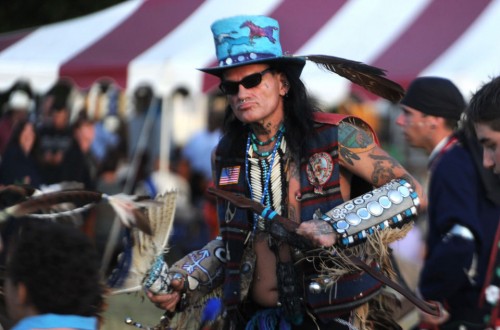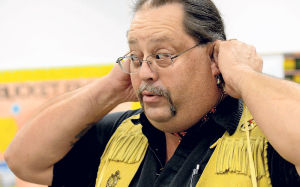
The Thomasina E. Jordan Indian Tribes of Virginia Federal Recognition Act of 2013 recently was passed out of the Senate Indian Affairs Committee to await a vote in the full U.S. Senate. If the legislation passes, it would grant federal recognition to six Virginia Indian tribes, including the Monacan Indian Nation.
By Sherese Gore, NewEraProgress.com
The six tribes have a “long and well-known history but have been uniquely disadvantaged because they’ve never been federally recognized,” he said.
The 2013 bill follows many years of efforts by the Monacan Indian Nation to receive recognition from the federal government. Doing so would provide a host of benefits, including medical and educational services as well as tribal sovereignty.
The Monacans have resided in central Virginia for millennia, and today claim Bear Mountain in Amherst County as their cultural base.
In 1908, an Indian mission was formed at the base of the mountain, which provided a church and a school for the Monacan community.

Former Monacan tribal council member Joseph Twohawks, shown here interacting with students at Rockfish River Elementary School in Nelson County, said gaining federal recognition can be a matter of pride. “For most people, you’ve called yourself something for all these many years, and now somebody with the powers that be agrees with it,” he said.
According to a former tribal council member Joseph Twohawks, federal recognition means different things to different people. To some, the recognition represents financial benefits. For others: pride.
Although the tribe has held state recognition since the 1980s, little has come from that aside from letters of apology and recognition; if you’re Native American with a tribal card, you can hunt and fish without a license, Twohawks said.
“For most people, you’ve called yourself something for all these many years, and now somebody with the powers that be agrees with it,” Twohawks said.
Gaining federal recognition is a “tough long process,” he said, that hasn’t been without its opponents.
According to Twohawks, the tribe first attempted to gain federal recognition through the Bureau of Indian Affairs, but the tribe only satisfied six of the BIA’s seven requirements that attempt to affirm historic and cultural tribal identity.
Establishing a historical identity is nearly impossible for Virginia Indians.
With the passage of Virginia’s Racial Integrity Act in 1924, a person could be classified as either “white” or “colored,” and the marriage and birth records of tribal peoples were altered.
Striving for congressional status has been met with roadblocks, as some legislators in recent years have been leery of Virginia’s tribes gaining federal recognition because of the fear that the tribes would establish casinos on their lands.
The 2013 bill satisfies that issue, according to Kaine. According to the bill, the six tribes “may not conduct gaming activities as a matter of claimed inherent authority or under any Federal law.”
Another issue that has hindered Virginia Indians from being recognized by the federal government is that they made peace too soon, Kaine said.
While the status of many of the nation’s western tribes is established because those peoples formed treaties with the U.S. government, the Monacans signed the Treaty of Middle Plantation of 1677 with the British, nearly 100 years before the Declaration of Independence, he said.
“Because they made a treaty with the English and not the American government, it has worked against them,” Kaine said.
But while the bill awaits time on the Senate floor, an irony exists outside its doors, Kaine said.
Blocks from the U.S. Capitol and resting inside the Smithsonian’s National Museum of American History is a diorama that explores the story of Virginia’s indigenous peoples.
“But we will not recognize living and breathing members of those tribes,” Kaine said.
